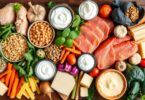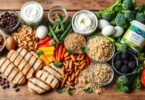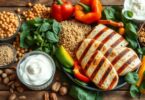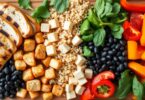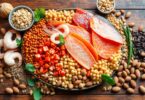Ever felt drained of energy or lethargic post-meals? The answer might be in protein-rich foods. As a personal trainer, I’ve seen how the right protein can elevate well-being and aid in fitness goals.
Protein is vital for muscle, tissue, and organ growth, repair, and upkeep. Adequate high-quality protein intake unlocks numerous benefits, including enhanced muscle strength, better recovery, and improved cognitive function.
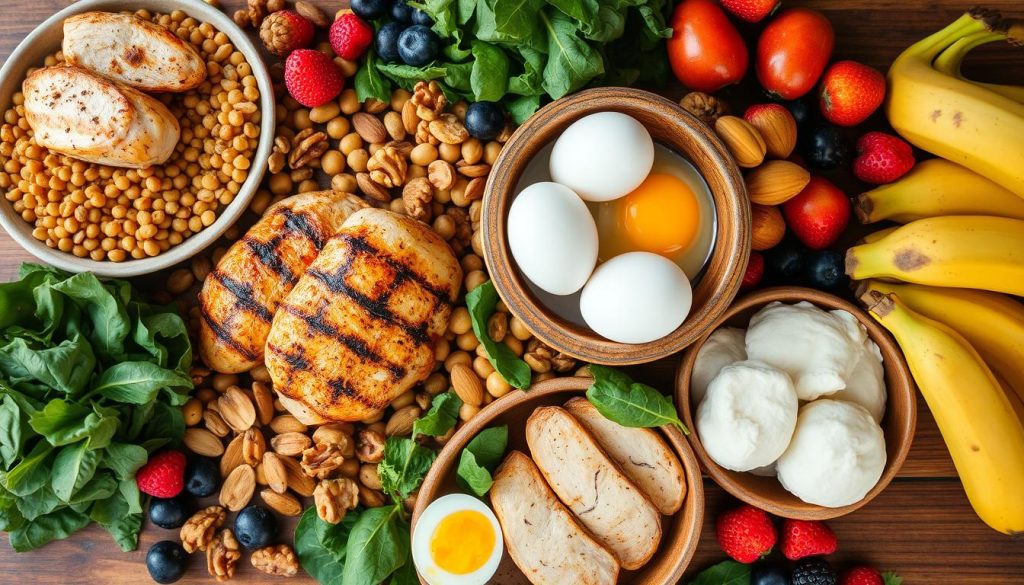
Key Takeaways
- Protein is essential for maintaining muscle mass, supporting immune function, and promoting overall health.
- Incorporating a variety of protein-rich foods into your daily diet can provide a full spectrum of amino acids and other essential nutrients.
- High-protein diets can support weight loss by increasing feelings of fullness and boosting metabolism.
- Lean meats, seafood, dairy products, eggs, legumes, and plant-based sources are all excellent protein options.
- Proper protein intake can enhance athletic performance, muscle recovery, and overall energy levels.
Understanding the Importance of Dietary Proteins
Dietary proteins are the fundamental components of our bodies, crucial for maintaining health and well-being. These protein sources are comprised of essential amino acids, pivotal for a multitude of vital functions within the human organism.
Role of Amino Acids in Body Functions
Amino acids form the basis of protein synthesis, enabling the growth and repair of tissues, muscles, and organs. They are also integral in the production of enzymes, hormones, and antibodies, indispensable for proper bodily functions.
Daily Protein Requirements for Different Age Groups
- Infants and children: 0.85-1.2 grams of dietary proteins per kilogram of body weight
- Adolescents: 0.85-0.95 grams of dietary proteins per kilogram of body weight
- Adults: 0.8-1 gram of dietary proteins per kilogram of body weight
- Older adults: 1-1.2 grams of dietary proteins per kilogram of body weight
Benefits of Meeting Protein Needs
Adhering to the appropriate intake of protein for better health yields numerous advantages, including:
- Maintaining and building muscle mass
- Supporting bone health and strength
- Boosting immune function
- Regulating metabolism and energy levels
- Promoting healthy skin, hair, and nails
By grasping the significance of dietary proteins and integrating a variety of protein-rich foods into your daily regimen, you can guarantee that your body receives the necessary amino acids for optimal functioning.
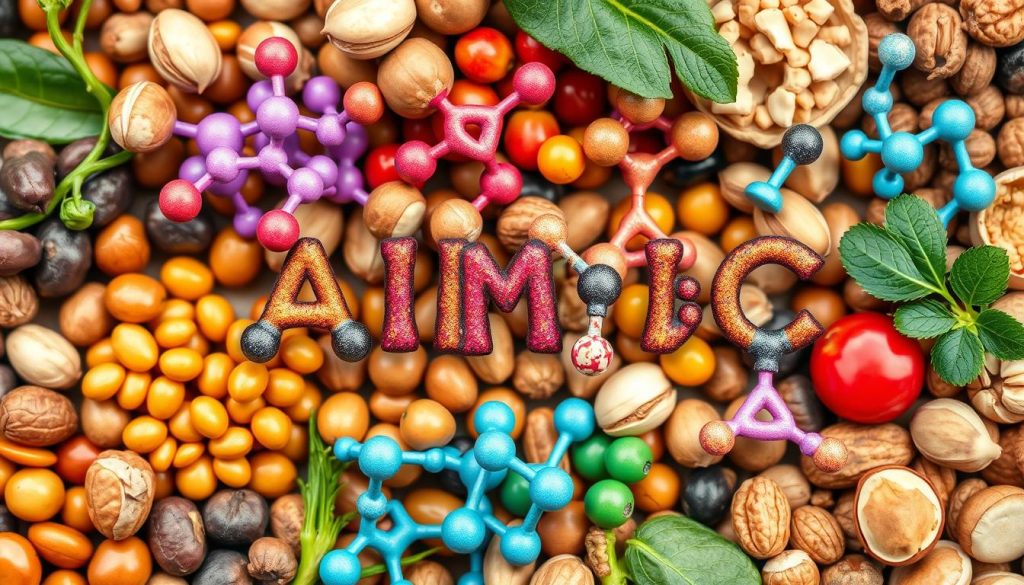
“Protein is the building block of our bodies, and it’s essential for maintaining overall health and wellness.”
Lean Meats: Premium Sources of Complete Protein
In the realm of muscle building and maintenance, lean meats stand out as premier protein sources. These high-quality proteins not only facilitate muscle building but also contribute a plethora of essential nutrients. This combination optimizes health and well-being.
Lean meats are distinguished by their provision of complete proteins. They contain all the essential amino acids necessary for bodily functions. This characteristic makes them exceptionally effective for protein for muscle gain. It also aids in the recovery and repair of muscle tissue.
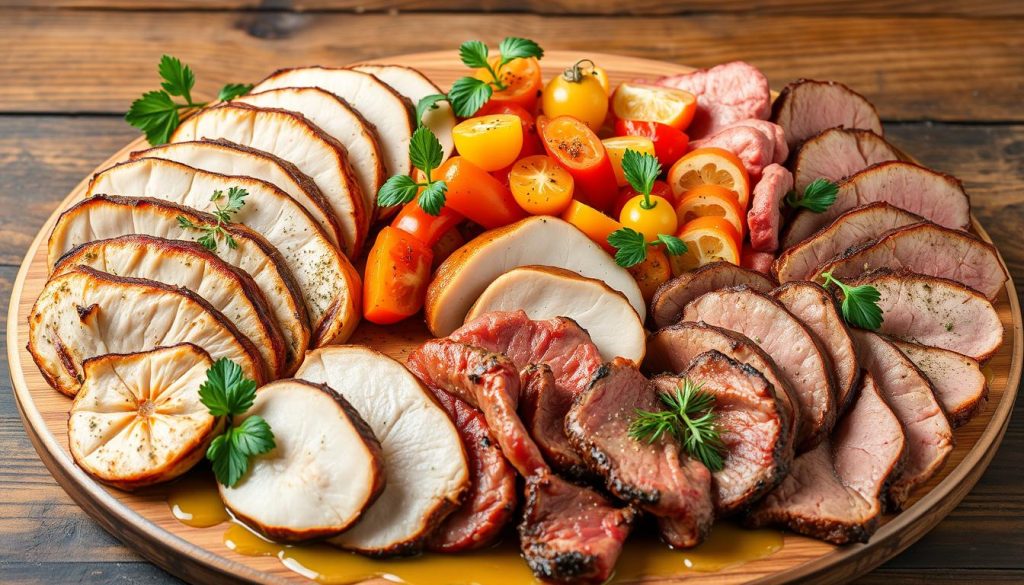
- Chicken breasts
- Turkey breasts
- Lean cuts of beef, such as sirloin or flank steak
- Pork tenderloin
- Lamb loin chops
To fully harness the benefits of these lean meats, it is crucial to prepare them healthily. Opt for grilling, baking, or sautéing with minimal added fats. This approach ensures a high protein intake while keeping calories and unhealthy fats in check.
“Lean meats are an excellent source of high-quality protein that can support muscle growth and overall health.”
By integrating a variety of lean meats into your diet, you can adequately meet your daily protein for muscle gain requirements. This supports your fitness and wellness objectives effectively.
Fish and Seafood: Omega-Rich Protein Sources
Fish and seafood stand out as protein-packed foods par excellence. They are not only rich in healthy protein-rich foods, but also a treasure trove of omega-3 fatty acids. These are crucial for heart health and cognitive function.
Wild-Caught vs. Farm-Raised Options
The discussion between wild-caught and farm-raised fish continues. Wild-caught generally boasts superior nutritional profiles. However, protein foods for health can also be found in well-managed aquaculture. The critical factor is selecting high-quality, sustainably sourced seafood.
Best Fish Varieties for Protein Content
Among the elite fish for protein-packed foods are tuna, salmon, halibut, cod, and trout. These species are not only high in complete proteins but also rich in omega-3s and vital vitamins and minerals.

Seafood Preparation Tips for Maximum Nutrition
To maximize the healthy protein-rich foods from seafood, focus on preparation methods. Choose baking, grilling, or poaching over frying. Also, avoid overcooking, which can diminish delicate nutrients.
“Seafood is one of the most versatile and nutrient-dense protein foods for health you can add to your diet.”
Incorporating a variety of protein-packed foods like fish and seafood into your diet offers numerous benefits. You’ll enjoy high-quality proteins, healthy fats, and a plethora of essential vitamins and minerals.
Protein-Rich Foods for Vegetarians and Vegans
Adhering to a plant-based diet necessitates a diligent search for plant-based proteins. Fortunately, a plethora of high-protein vegetarian foods and protein-rich vegan foods exists, enabling vegetarians and vegans to fulfill their daily protein requirements.
Legumes, such as lentils, chickpeas, and black beans, stand out as premier sources of plant-based proteins. These ingredients are not only rich in protein but also in fiber, vitamins, and minerals, making them a valuable component of any meatless meal.
- Tofu and tempeh, renowned for their versatility, serve as excellent protein-rich vegan foods, suitable for a myriad of dishes, from stir-fries to burgers.
- Seitan, a wheat-based meat substitute, is another exemplary source of plant-based proteins.
To ensure a complete amino acid profile, vegetarians and vegans must combine different plant-based proteins throughout their day. For instance, pairing grains with legumes or nuts and seeds with vegetables can provide a comprehensive range of essential amino acids.
“Incorporating a variety of plant-based proteins into your diet is key to meeting your daily protein requirements as a vegetarian or vegan.”
From hearty lentil stews to flavorful tofu scrambles, numerous delectable methods exist to integrate high-protein vegetarian foods and protein-rich vegan foods into one’s meals. By diversifying plant-based proteins, one can guarantee that their body receives the necessary nutrients for optimal health.
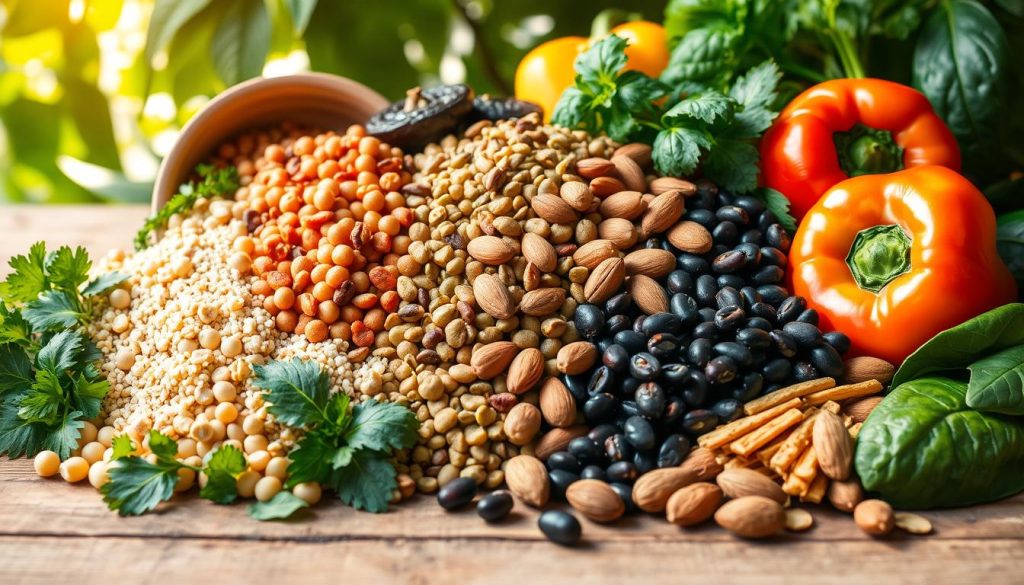
Dairy Products: Complete Protein Sources
The realm of high-protein dairy is vast and varied. From the creamy texture of yogurt to the savory richness of cheeses, dairy products stand out as a premier source of complete protein. This is crucial for both muscle recovery and maintaining skin health.
Best Low-Fat Dairy Options
For individuals aiming to enhance their protein intake while minimizing fat, low-fat or non-fat dairy options are ideal. Greek yogurt, cottage cheese, and skimmed milk are exemplary choices, offering a concentrated protein content. These high-protein dairy selections can be effortlessly integrated into a myriad of dishes, from smoothies and salads to baked goods, thereby enriching them with protein.
Lactose-Free Alternatives
Not all individuals can digest lactose, the inherent sugar in dairy. Fortunately, there are numerous protein food for recovery and protein foods for skin health options available for those with lactose intolerance. Lactose-free milk and dairy products derived from alternatives such as almond, soy, or oat milk offer comparable nutritional benefits without the gastrointestinal distress.
“Dairy products are a fantastic source of high-quality, complete protein that can support muscle recovery and skin health.”
Whether you prefer low-fat or lactose-free varieties, dairy remains a versatile and nutrient-dense component of a balanced diet.
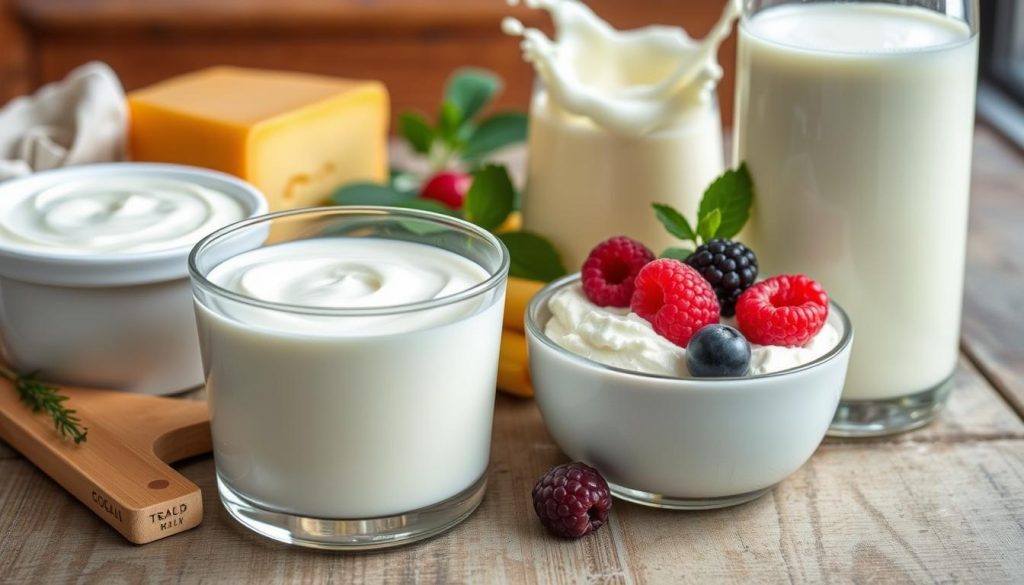
Eggs: The Versatile Protein Powerhouse
Eggs emerge as a paramount source of protein, embodying a confluence of nutritional density and versatility. They are not merely a high-quality protein source for weight management but also contribute to enhanced energy levels and hair growth.
As a complete protein, eggs contain all essential amino acids, with a single large egg delivering 6 grams of protein. This makes them an invaluable component of any meal or snack. Eggs are also a treasure trove of vitamins, minerals, and antioxidants, fostering overall health and well-being.
Their versatility is unmatched. Eggs can be prepared in myriad ways, from scrambled and fried to boiled and poached. This adaptability allows for a personalized culinary experience, catering to diverse tastes and dietary requirements.
“Eggs are one of the most nutrient-dense foods on the planet, providing a wide range of essential vitamins, minerals, and antioxidants in addition to high-quality protein.”
In the context of weight loss, eggs’ protein content aids in satiety, thereby reducing the propensity for overindulgence. The vitamins and minerals, such as vitamin B12 and iron, contribute to elevated energy levels, facilitating sustained activity and engagement.
Regarding hair health, eggs’ protein is pivotal for hair growth. The amino acids within eggs fortify and nourish hair follicles, promoting robust hair growth and minimizing breakage.
In conclusion, eggs are a quintessential protein-rich food, offering multifaceted benefits. They are an excellent choice for those aiming to enhance their weight loss efforts, boost energy levels, or improve hair health. Incorporating eggs into your diet is a simple yet effective way to harness these advantages.
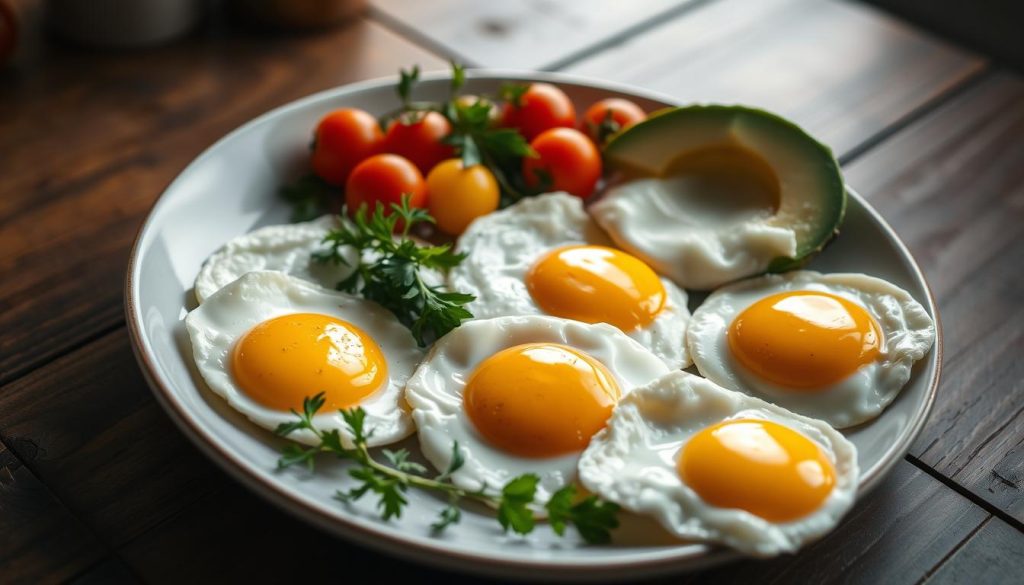
Legumes and Pulses: Plant-Based Protein Champions
Legumes and pulses stand out as the plant-based protein champions. These ingredients are not only rich in protein but also packed with essential vitamins, minerals, and fiber. Adding them to your protein-rich meals significantly enhances your nutrition and supports a balanced diet.
Cooking Methods to Enhance Protein Absorption
To maximize the benefits of protein-rich legumes, understanding the best cooking methods is crucial. Soaking and sprouting legumes can enhance protein absorption by breaking down antinutrients. Proper cooking techniques, such as pressure cooking or slow simmering, further improve the bioavailability of proteins and other nutrients.
Combining Legumes for Complete Proteins
Legumes and pulses are excellent sources of high-protein grains, but they lack certain essential amino acids. By combining different legumes, you can create dishes with a complete amino acid profile. For instance, pairing lentils with rice or chickpeas with whole-wheat pita ensures your body receives all necessary amino acids.
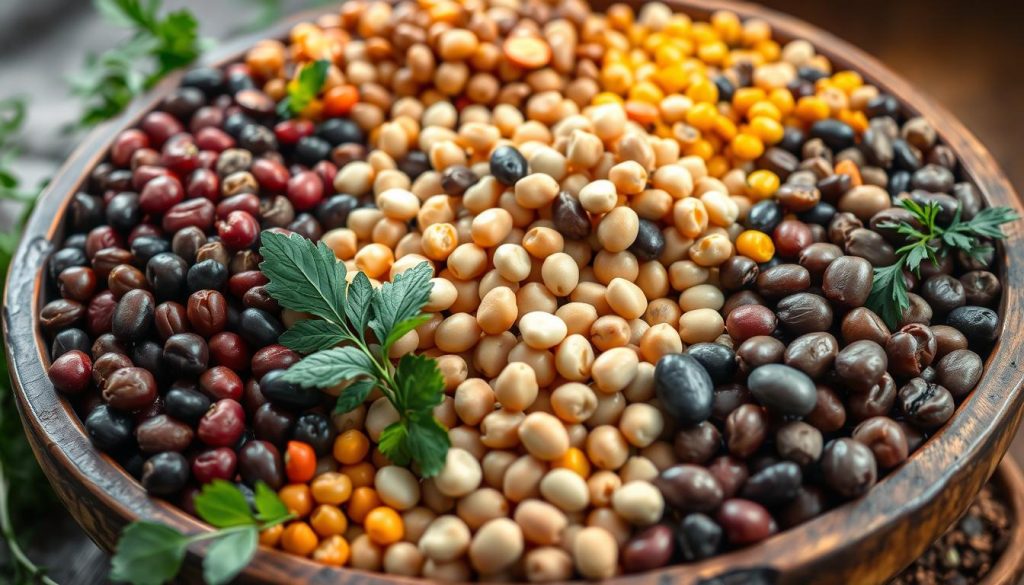
“Legumes are a fantastic source of plant-based protein, offering a range of health benefits beyond just their protein content. Incorporating them into your diet is a simple yet powerful way to support overall wellbeing.”
Nuts and Seeds: Protein-Packed Snacking Options
The humble nut and seed are pivotal in enhancing protein intake. These snacks, rich in protein, offer a convenient and nutritious solution to hunger. They support overall health, making them essential in a balanced diet. From the crunch of almonds to the nuttiness of pumpkin seeds, these snacks are indispensable.
Nuts, such as almonds, walnuts, and pistachios, are a treasure trove of protein-rich nuts. They provide a satisfying crunch and are rich in healthy fats, fiber, and essential vitamins and minerals. They can be sprinkled on yogurt, added to trail mixes, or enjoyed alone for a protein-rich boost.
Similarly, protein-rich seeds like chia, flax, and hemp are nutritional powerhouses. These tiny but mighty high-protein snacks are loaded with protein, fiber, and omega-3 fatty acids. They can be incorporated into smoothies, sprinkled on salads, or used to make homemade energy bars for a portable and protein-packed snack.
“Nuts and seeds are a fantastic way to add protein, healthy fats, and a satisfying crunch to your diet. They’re the perfect on-the-go snack or versatile ingredient to boost the nutritional value of any meal.”
Whether you prefer crunchy or creamy, savory or sweet, there’s a protein-rich nut or seed for every taste. Experiment with different varieties to discover your new favorite high-protein snacks and fuel your day.
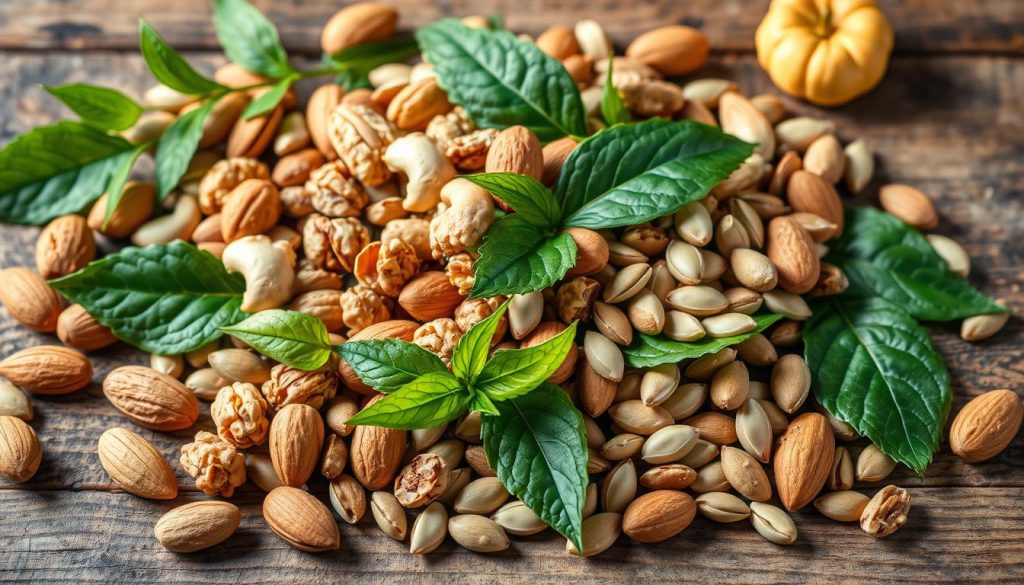
High-Protein Grains and Pseudocereals
Grains and pseudocereals are often underappreciated in the quest for a protein-rich diet. These foods, though often overlooked, are rich in essential amino acids, crucial for various bodily functions. Exploring ancient grains and versatile pseudocereals can significantly enhance your meals and snacks, providing a substantial protein boost.
Ancient Grains with High Protein Content
Quinoa, amaranth, and buckwheat stand out as ancient grains with remarkable protein content. Quinoa, celebrated as a “superfood,” is a complete protein, encompassing all essential amino acids. Amaranth and buckwheat also offer substantial plant-based protein, adding a unique nutty flavor and chewy texture to diverse dishes.
Preparation Methods for Maximum Benefits
- Incorporate quinoa, amaranth, and buckwheat into protein-rich recipes, such as grain bowls, pilafs, and even baked goods.
- Experiment with different cooking techniques, like simmering, steaming, or roasting, to unlock the full nutritional potential of these high-protein grains.
- Pair these protein-packed pseudocereals with lean meats, legumes, or dairy products to create complete, protein-rich meals.
By integrating these nutrient-dense grains and pseudocereals into your protein food list, you can significantly enhance your protein-rich recipes and protein-packed dishes. This will support your overall health and fitness objectives.
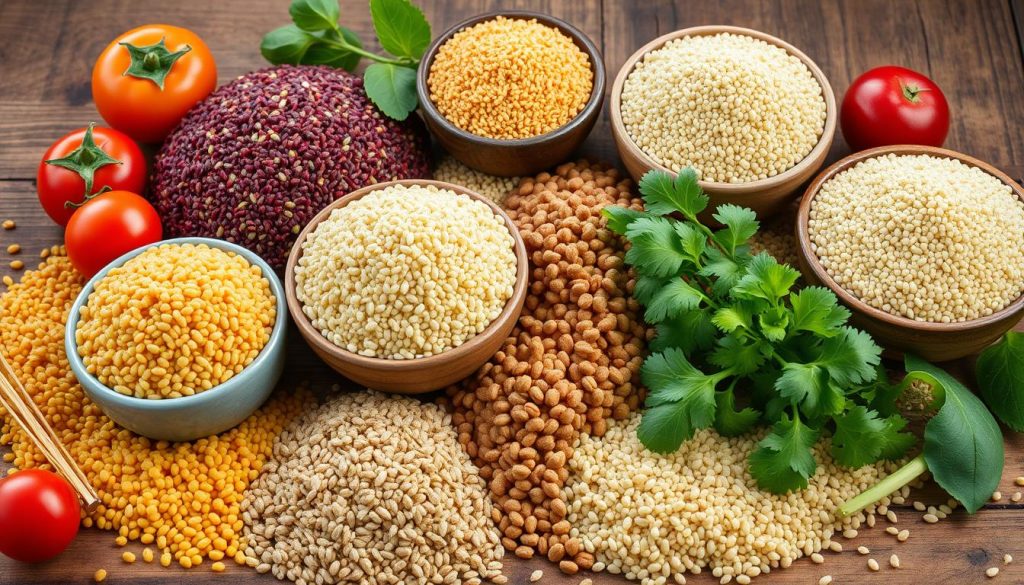
Protein Supplements and Powders
In the realm of muscle building and fitness, protein’s role is paramount. Whole, protein-rich foods such as lean meats, fish, eggs, and legumes form the bedrock of a balanced diet. However, for those seeking to augment their protein intake, supplements and powders emerge as a convenient solution. These products are particularly beneficial for athletes, bodybuilders, and anyone aiming to enhance muscle mass.
Protein supplements manifest in various forms, including whey, casein, plant-based options like soy, pea, or hemp, and blended varieties. Each type offers distinct advantages, catering to diverse dietary requirements and preferences. Whey protein, for example, is renowned for its rapid absorption, providing a swift surge of amino acids post-workout. Conversely, casein protein’s slow digestion ensures a prolonged release of amino acids, ideal for overnight muscle repair and growth.
- Whey protein: Quickly absorbed, great for post-workout recovery
- Casein protein: Slowly digested, supports overnight muscle repair and growth
- Plant-based proteins: Suitable for vegetarians and vegans, offer a range of beneficial nutrients
Selecting a protein supplement necessitates a consideration of personal needs, such as activity level, muscle-building objectives, and dietary restrictions or allergies. It is imperative to opt for high-quality, reputable brands that prioritize clean, minimally processed ingredients. Consulting with a healthcare professional or registered dietitian can facilitate the identification of the most suitable protein foods for fitness and an appropriate supplement regimen to align with wellness objectives.
“Protein supplements can be a valuable addition to a balanced, nutrient-dense diet, but they should never replace whole, protein-rich foods.”
Integrating protein-packed protein bars and powders into your regimen can be a practical strategy to ensure adequate protein intake and support fitness objectives. Nonetheless, it is crucial to acknowledge that these supplements should augment, not supplant, a comprehensive, protein-rich diet.
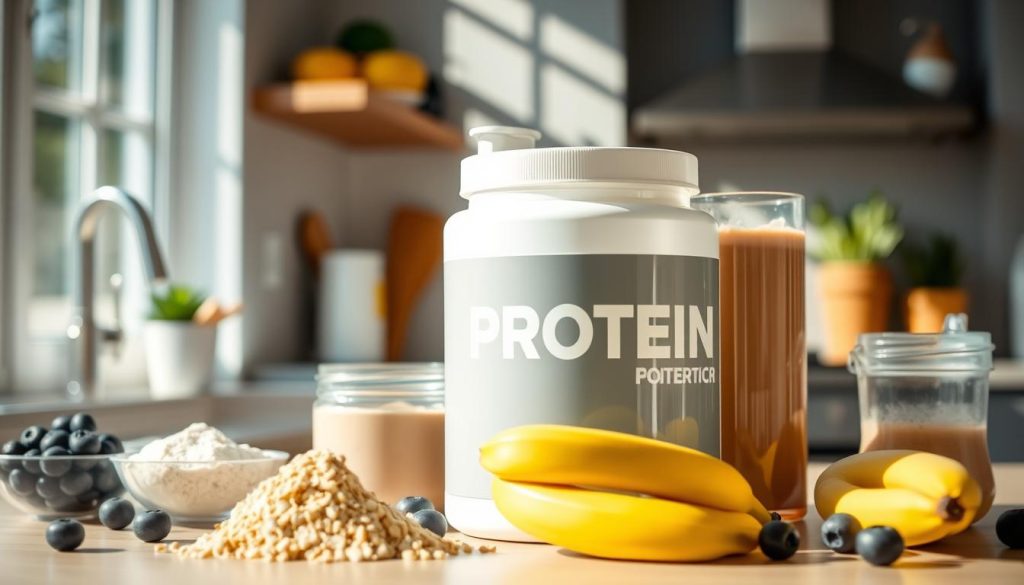
Protein-Rich Breakfast Ideas
Initiating your day with a protein-rich breakfast can significantly enhance your energy levels and support bodily functions. The inclusion of protein-rich breakfast foods, protein-rich smoothies, and high-protein recipes for beginners is crucial. It aids in fulfilling your daily protein requirements, thereby fueling your day with wholesome meals.
Quick High-Protein Morning Meals
For individuals with limited time, several rapid and simple high-protein breakfast options are available:
- Scrambled eggs with spinach and whole-grain toast
- Greek yogurt topped with berries and a sprinkle of nuts or seeds
- Protein-rich smoothie made with protein powder, nut butter, and fresh or frozen fruit
- Overnight oats with chia seeds, almond milk, and a spoonful of peanut butter
Meal Prep Suggestions
For a seamless morning routine, consider preparing some high-protein recipes for beginners in advance. Some ideas include:
- Hard-boiled eggs to enjoy on their own or paired with whole-grain crackers
- Frittata muffins with vegetables and cheese
- Overnight oatmeal jars with nuts, seeds, and dried fruit
- Protein-packed breakfast burritos with eggs, beans, and vegetables
By planning ahead and incorporating these protein-rich breakfast foods and protein-rich smoothies into your morning routine, you can start your day with a nutritious boost of energy and essential nutrients.
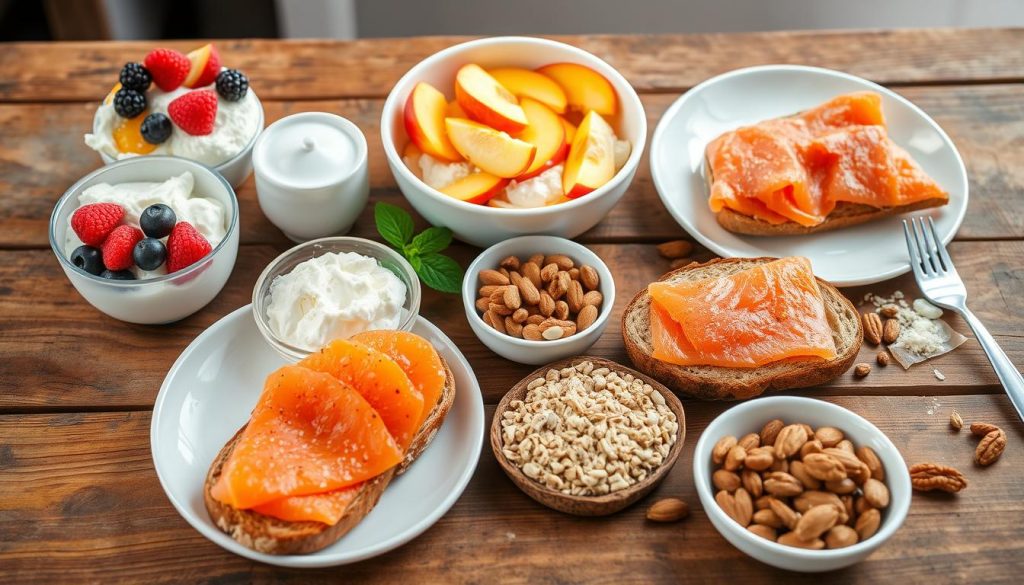
Building Muscle with Protein-Rich Foods
Attaining your fitness objectives, whether it’s enhancing muscle mass or maintaining a lean physique, hinges on a diet abundant in high-quality protein for strength. Protein serves as the fundamental component of muscle, and integrating the appropriate foods to build muscle into your daily regimen significantly influences outcomes.
For those seeking high-protein foods for bodybuilders, prioritize lean meats, fish, dairy products, eggs, legumes, and nuts. These foods are rich in essential amino acids, crucial for muscle repair and growth.
- Choose lean cuts of beef, pork, or chicken to enhance protein intake while reducing fat and calories.
- Include fatty fish like salmon, tuna, and mackerel for their omega-3 fatty acids, which aid in muscle recovery.
- Dairy products such as Greek yogurt, cottage cheese, and low-fat milk are convenient for increasing protein levels.
- Eggs, a versatile, affordable, and high-quality protein source, can be enjoyed at any time.
- Legumes, including lentils, chickpeas, and black beans, offer plant-based protein along with fiber and complex carbohydrates.
- Nuts and seeds, such as almonds, pumpkin seeds, and chia seeds, provide a portable, protein-rich snack option.
Proper timing of protein intake is vital for muscle building. Aim to consume a serving of protein-rich food with each meal and snack. Consider adding a protein supplement, such as whey or casein, around workouts for enhanced benefits.
“Proper nutrition, including adequate protein for strength, is essential for building and maintaining muscle mass. By incorporating a variety of foods to build muscle into your diet, you can support your fitness goals and reach your full potential.”
A balanced diet, with a focus on high-quality protein for strength, forms the cornerstone for muscle building and achieving fitness objectives. Experiment with different high-protein foods for bodybuilders to discover those that align with your taste preferences and lifestyle.
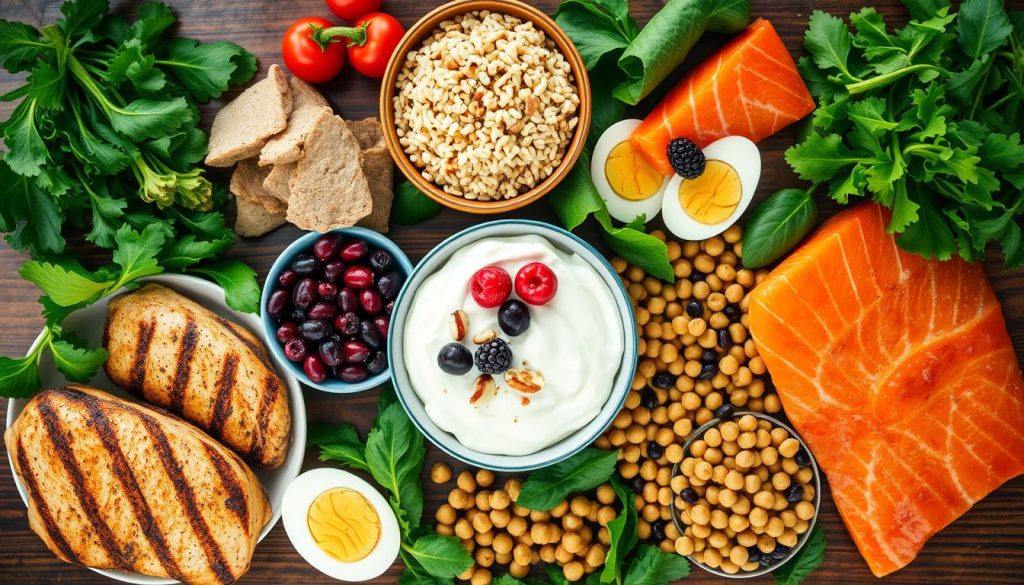
Protein for Weight Management and Fat Loss
Incorporating protein-rich foods into your diet can significantly aid in weight management and fat loss. The thermic effect of protein, which is the energy your body expends to digest and metabolize it, surpasses that of carbohydrates and fats. This heightened energy expenditure contributes to a slight metabolic boost, facilitating the burning of more calories throughout the day.
Foods high in protein, such as lean meats, fish, eggs, and legumes, induce feelings of fullness and satiety. This reduces the propensity for overeating. By integrating these protein-rich options into your meals and snacks, you can experience enhanced satisfaction and diminished appetite. This makes adhering to a calorie-controlled diet more manageable, facilitating effective weight management.
Protein-rich foods, including quinoa, Greek yogurt, and almonds, offer a steady supply of essential amino acids. These amino acids support various bodily functions, including muscle maintenance and growth. Consequently, they enhance your metabolic rate, as muscle tissue burns more calories than fat tissue, even at rest. Incorporating a variety of these protein-rich foods into your balanced diet is a critical step in your weight loss journey.
FAQ
What are the best protein-rich foods to add to my daily diet?
To enhance your daily protein intake, consider lean meats such as chicken, turkey, and lean cuts of beef. Fish and seafood, including varieties like salmon and shrimp, are also beneficial. Eggs, dairy products, legumes, nuts, and seeds offer a diverse range of protein sources. These options support your health and fitness objectives.
How much protein do I need each day?
Daily protein needs vary based on age, activity level, and health status. Adults generally require 0.8-1.2 grams of protein per kilogram of body weight. Those engaging in intense physical activities or aiming to build muscle may need up to 2 grams per kilogram.
What are the benefits of a high-protein diet?
A high-protein diet aids in muscle growth and repair, supports bone health, and aids in weight management. It also provides sustained energy and plays a crucial role in immune function and hair, skin, and nail health.
What are some good lean meat options for protein?
Opt for lean meats like chicken breast, turkey breast, and lean cuts of beef. Pork tenderloin and game meats such as bison or venison are also excellent choices. These options are low in fat and rich in protein, essential for muscle building and overall health.
Why are fish and seafood good sources of protein?
Fish and seafood are not only high in protein but also rich in omega-3 fatty acids. Salmon, tuna, cod, halibut, and trout are among the best protein-rich fish options. Shrimp, scallops, and mussels are also great choices for vegetarians and vegans.
What are some good protein-rich options for vegetarians and vegans?
Vegetarians and vegans can find numerous protein-rich foods. Legumes, tofu, tempeh, seitan, quinoa, chia seeds, and nuts and seeds are all excellent options. Combining different plant-based proteins ensures a complete amino acid profile.
What are the benefits of dairy products as a protein source?
Dairy products, such as milk, yogurt, and cheese, are rich in complete, high-quality protein. They also provide calcium, vitamin D, and other essential nutrients. Opt for low-fat and lactose-free options to manage fat or lactose intake while increasing protein.
Why are eggs considered a protein powerhouse?
Eggs are a versatile and nutrient-dense protein source. They contain all essential amino acids and are easily absorbed by the body. Eggs support weight loss, provide sustained energy, and promote healthy hair, skin, and nails when part of a balanced diet.
How can I incorporate more protein-rich legumes and pulses into my diet?
Legumes and pulses, such as lentils, beans, peas, and chickpeas, are excellent plant-based protein sources. Soaking, sprouting, or cooking them properly maximizes protein absorption. Combining different legumes and grains creates complete protein meals.
What are some high-protein snack options made from nuts and seeds?
Nuts and seeds, such as almonds, walnuts, and chia seeds, are fantastic for snacking. Enjoy them on their own, in trail mixes, or as ingredients in energy bars and smoothies. They offer a convenient way to boost your protein intake.
What are some high-protein grains and pseudocereals I should know about?
Quinoa, amaranth, buckwheat, and teff are high-protein grains and pseudocereals. These nutrient-dense ingredients can be used in various dishes, from breakfast porridges to baked goods, to increase your protein intake.
How can I use protein supplements and powders effectively?
Protein supplements and powders are convenient for increasing protein intake, especially for active individuals or those with specific fitness goals. Choose high-quality sources like whey, casein, or plant-based proteins. Consult a healthcare professional to determine the appropriate dosage and timing for your needs.
What are some protein-rich breakfast ideas to start my day?
For a protein-packed breakfast, consider Greek yogurt with berries and granola, eggs with whole-grain toast, or a smoothie with protein powder and nut butter. Overnight oats with nuts and seeds are also excellent options. These meals provide a balance of protein, complex carbohydrates, and healthy fats to fuel your day.
How can I use protein-rich foods to build muscle and strength?
Adequate protein, especially around workout times, is crucial for muscle growth and recovery. Include lean meats, fish, eggs, dairy, and plant-based proteins like legumes and quinoa in your meals and snacks. Strategic timing and pairing with strength training maximizes muscle building and fitness benefits.
How does protein help with weight management and fat loss?
Protein aids in weight management and fat loss by increasing feelings of fullness, boosting metabolism, and preserving lean muscle mass during weight loss. Incorporating protein-rich foods throughout the day supports your health and fitness goals.

